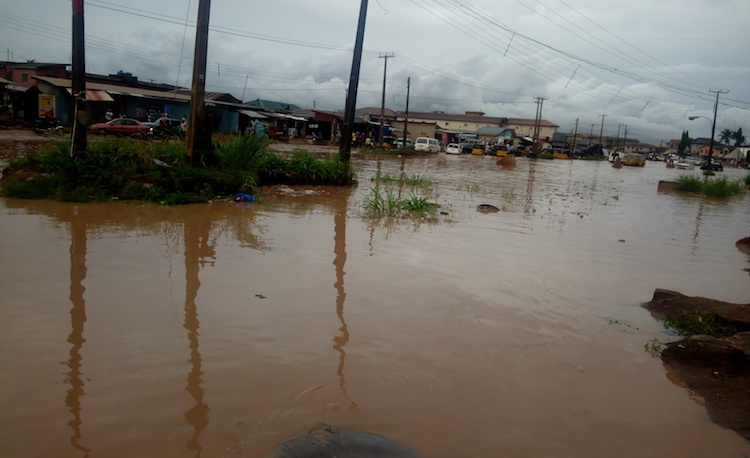By Chinyere Anyanwu
Catfish farmers in Ikorodu woke up to a rude shock on August 3 to discover that relentless floodwaters had swept through their ponds, wiping our stock and submerging investments worth over N150 million.
The victims, now slapped with debt and grief, are crying out for the government to throw them a lifeline.
Their challenges have been compounded by lack of insurance to absorb the losses, accentuating the need for some sort of commercial security around business ventures.
According to the President-elect of the Lagos State Catfish and Allied Farmers Association (LASCAFAN), Olatoye Fajimi, who spoke on the incident with Daily Sun at the weekend, over 50 fish farmers operating in 11 fish farm clusters around the Ikorodu Kingdom were affected.
The clusters located in Elepe, Igbe, Gberigbe, Gbaga 1&2, Erikorodo, Lucky Fibre, Maya, Adamo and Mowo Kekere were overflown with flood, which completely erased the resources of the fish farmers and hard work of over six months.
The LASCAFAN president-elect, who noted that the incident poses a major threat to food security as well as job security, called on the private sector and the Lagos State government to come to their aid.
Fajimi said, “we solicit for the support of the government through the provision of cash grants for the farmers to cushion the effect of the loss of business capital. The government should assist us by compensating farmers who have suffered these losses owing to this natural disaster.”
Among other ways the fish farmers are seeking government intervention are the: “immediate deployment of swamp boogies to clear the canals and waterways; a quarterly schedule by the government for clearing and maintenance of the waterways to prevent future flooding of the farm lands; provision of tarpaulin ponds and solar pumping machines for fish farmers who may be required to relocate away from the critical areas; and provision of farming inputs such as juveniles and fish feed to enable the farmers restart their businesses immediately to prevent loss of jobs and livelihood.”
On the havoc wreaked by the flood on businesses of LASCAFAN members during a monitored radio programme last Thursday, Fajimi explained: “The rain which started around 7pm on Sunday, August 3rd kept increasing in tempo and fell till the next day, Monday, August 4th. By the time we got to the farm around 7am, all the ponds were overflown with flood. There is a lot of despair in the hearts of the people now. There were no indications that anything like that would happen. Throughout July, farmers put in a lot of measures to ensure their farms were safe and when July ended and we got into August, we said thank God, it’s August break but between Sunday, August 3rd and Monday, August 4th, it was a pathetic situation. A lot was lost. About 15 of my ponds were affected.
“We sell on a monthly basis. By the time we got to the ponds on Monday, August 4th, the fish that were due for sale in August, September and October had been washed away. When we tried to value the number of fish lost, it was about 17,000 pieces of fish. In terms of monetary value, personally on my own farm, we lost about N15 million. There are 11 clusters of fish farms in Ikorodu. Both young and old, including a lot of female farmers, were affected by the incident. A lot of young farmers who are just coming into the business have been affected.”
Continuing, he said, “before now, earlier in the year, we had cleared the drainages around the farm. If the rain had fallen mainly during the day, farmers would have been on ground with nets to salvage some of the fish but the rain caught us off guard. It started around 7pm and fell throughout the night and by 7am the next day when we got there, the whole fish had been washed away. We know that rain is an annual activity so we watch weather forecasts and send signals to our farmers to clear the roads to their farms and build embankments around the ponds but because of the volume of the rain from Sunday through Monday, all the efforts put in place could not withstand the volume of water that came down that day. All the fish followed the flow of water to the major canals around the area.”
Fajimi, assessing the economic value of losses and effects on the state’s food security, said: “The flood affected a lot of clusters and assessing the losses, it’s well over N150 million. A kilogramme of fish is sold for between N3,000 and N3,500 at farmgate price and farmers usually stock between 1, 000 and 10,000 pieces of fish in each pond. I lost 17 ponds, some lost 10, some lost eight. It’s a devastating economic loss. And we employ a lot of young people including IT students, women and students. So this is threatening job security as well.
“Our aim as an association and group of farmers is to ensure that there is a consistent supply of fish protein, which is about the best and cheapest form of protein. So, our plan is to make it consistently available and affordable for Lagosians but right now, a lot of those fish are no longer available for the market. With this situation, we could lose one of the biggest fish producing hubs in Lagos State. So you can imagine what magnitude of loss that is going to be for the farmers and the whole populace.
“Before now, we have been relating very well with the Lagos State government and the Ministry of Agriculture. The governor and the commissioner for Agriculture have been very supportive of fish farmers from time to time. They came up with a novel programme in February which was the 25 per cent discount offered to farmers for the purchase of fish and feed. A lot of farmers within Ikorodu and across Lagos State benefitted from that project. It ran for five continuous weeks and we appreciate that. We had hoped that that would continue to happen from time to time. And the gains that farmers had during that programme, these are the fish that we produced with the feed we bought at 25 per cent discount, hoping that by now farmers would sell the fish and make some good profit. Feed used to be about 70 – 80 per cent of our production cost and the government had paid about 25 per cent of that. That was a lot of relief to farmers. We appreciate that. We were hoping that by the time we are selling the fish, prices would become affordable for the buyers since our production cost has been subsidised by the government. But alas, all the fish have been lost.”
Forestalling recurrence
Furthermore, the LASCAFAN helmsman, speaking on long term measures to forestall such devastating incidents and prevent heavy losses, said, “government has always come to our aid in the past. Last year and the previous one, the government had cleared the drains. We are hoping that subsequently there will be a regular programme, maybe every quarter, to clear the drains effectively so that in the future when there are such flash floods, there will be enough drainage space for the water to flow through instead of being withheld around the farms and overflowing the ponds.
“We are also hoping that farmers in the areas that are prone to heavy flooding can be relocated to solid areas where they can restart their business in a safer environment. There is also this cage system that the LSAD started some years ago. We are hoping that this can also be introduced to our farmers to ensure that even when the water level rises, the fish can still be caged within the ponds and not flow away with the flood water.
“As it is now, the farmers have gone to ground zero. A lot of staff will lose their jobs and because the fish we ought to supply to the market this month have been lost, food security will be threatened. Imagine the number of customers who will be affected as a result of this incident.”
No insurance
Fajimi, who noted that the farms were not insured, stated that plans are underway to introduce a viable agricultural insurance provider to the fish farmers across the state.
According to him, “insurance is another thing we are hoping that the government can enlighten the farmers about and let’s have an arrangement that makes it affordable and accessible. When there is agricultural insurance and this kind of thing happens, farmers can be able to get something to start their business again. Before now, at the Ikorodu zone, we brought in an insurance broker to enlighten the farmers and I think we need to do that again. People often take insurance as something that is not affordable but with what has happened, I think we have to reiterate it. Insurance means paying a particular percentage of your capital annually as premium so that when you have a major loss like this, which is not due to your fault or negligence, the insurance company can reimburse you with your operating capital with which you can start your business all over again. It’s time to go back to the drawing board and look at insurance again; demystify it and make it available to farmers across the value chains, not just fish.”
The growing reality of climate change and its far-reaching devastation on human life, particularly agriculture and food security, is undeniable.
Experts and stakeholders in this critical sector of survival are urging the adoption of climate-smart agricultural practices to safeguard livelihoods and ensure a sustainable future.

















Leave a comment